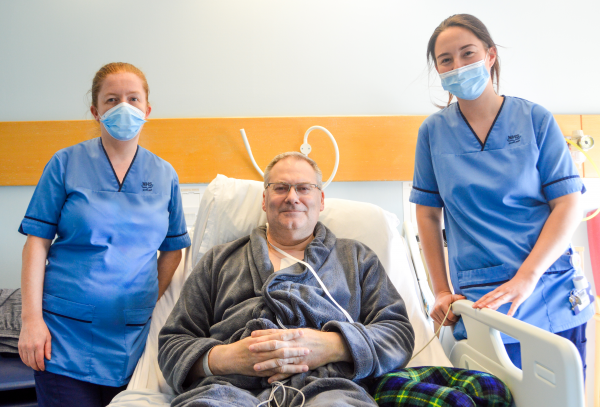
Endoscopic vessel harvesting (EVH) surgery is providing heart patients with minimally invasive surgery, giving them a more comfortable recovery after their operation and considerably reduced leg scarring.
The Golden Jubilee University National Hospital is the first in Scotland to carry out the surgery as a routine procedure.
During traditional coronary artery bypass (CABG) surgery, surgeons take arteries from the chest and two or more long saphenous veins*, which means an incision from the top to the bottom of the leg.
With EVH surgery, there are only a few small 2cm incisions to harvest the vein, post-operatively resulting in tiny scars and less pain, much quicker recoveries and shorter hospital stays for the patient.
There are also benefits for NHSScotland as shorter hospital stays means more available beds and faster waiting times for patients, helping the country’s recovery.
Less scarring from large incisions also means little, or no, follow-on care for patients from their local health boards after discharge, as well as less risk of re-admission from wound infections.
NHS Golden Jubilee Cardiothoracic Consultant, Fraser Sutherland, said: “Cardiac surgery is constantly evolving. New procedures have enabled surgeons to perform more complex surgery on increasingly frail patients who, in the past, may not have been eligible.
“Innovative clinical developments, such as EVH, include minimally invasive surgery which is becoming more common place and contributes to quicker patient recovery, shorter length of hospital stay and improved patient outcomes.
“The goals of introducing EVH into routine surgery is for these specific reasons, as well as to improve the working posture of surgical care practitioners during surgery, which is expected to reduce back strain on those carrying out these operations.
“We believe EVH surgery will bring many additional benefits to NHS Golden Jubilee and to NHSScotland over time, including cost savings and improvements in efficiency.”
Patient Alex Miller, 55, a Project Development Manager from North Lanarkshire, first had heart problems around 14 years ago when he had a ‘small’ heart attack while watching one of his son’s football training sessions.
Alexander said: “I went to Monklands and it was found that there was a blockage and it was flushed out by A&E [Accident and Emergency] staff there so I didn’t need any surgery at the time.
“But last year I began getting out of breath doing simple things like walking and even on video calls for work. From there I went through some tests and ended up needing this surgery.
“In terms of the surgery, I think it’s been as close to a pain-free procedure as I could ever have hoped, which is quite amazing compared to the more traditional method.
“I’m absolutely delighted to have got this surgery, I can’t imagine what the difference would have been like with a large leg wound, so I think it is just astonishing and a fantastic approach.
“If you are feeling out of breath more easily, feeling really tired and maybe carrying a few more pounds than you used to, I would say go and get checked out. I thought it was just because I was getting older, but it was much more serious than that.”
In the West of Scotland, cardiac surgery is provided by NHS Golden Jubilee, with some elements of this service provided for the whole of NHS Scotland under national service arrangements, and also for other territorial boards when required.
Director of Heart, Lung and Diagnostic Division, Lynne Ayton, said: “NHS Golden Jubilee has a vision to achieve the best possible outcomes for patients and their families, and improve efficiencies in terms of making optimal use of resources and technology.
“Our plan is to train and deliver EVH to Surgical Care Practitioners (SCPs) across Scotland in collaboration with the NHS Scotland Academy, providing practical support for the Academy’s vision of enhancing the skills of the Scottish NHS workforce.
“This will help NHS Scotland deliver high quality care through our existing regional and national services and our elective care provision. In addition, we will develop our hospital services to meet increasing demand and continually improve how they are delivered for our patients.”


